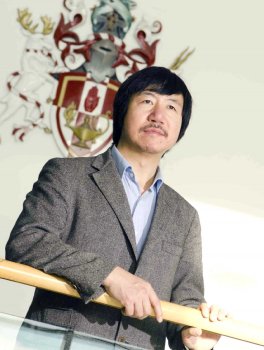
The University of Ulster has appointed Dr Hui Wang to a Chair in Computer Science.
Professor Wang is the first Chinese-born academic to become a professor in the University. He has built an international reputation for his outstanding contribution to the fields of Artificial Intelligence, Pattern Recognition and Information Science.
A native of Tongliao City, PR China, he joined the University of Ulster in 1996 as a lecturer, rising to become Reader in Computing Science in 2007.
He studied for his PhD at Ulster, and has been leader of the University's Artificial Intelligence Research Group from 2009.
Professor Wang is also a Visiting Professor at Jilin University and Tsinghua University, China. He was a Visiting Scholar in 2004 at Metz University, France.
He is currently working on time series analysis and data/text mining with applications such as share price analysis, sentiment analysis and argumentation analysis, and has research links to world software giant SAP.
Commenting on his appointment, Professor Wang said:
“I am delighted and honoured to accept this appointment. I would like to thank the University for their recognition of my work through this appointment and also for providing state of the art research and teaching facilities to enable me to carry out my work; my line managers, Professor Bryan Scotney and Dr Paul Hanna, for their trust and support over the years; and my colleagues and friends for their encouragement and help. I would also like to thank my family for their persistent love and belief in me.
“It has been a privilege for me to study as a PhD student and to work as an academic in this University, in a place that I see as my second home and one that I love so much. I spent the best of my times in Northern Ireland, which I enjoyed so much. I am proud to be a Chinese Northern Irish man, as well as an academic in the University of Ulster.
“This appointment, I feel, gives me a higher sense of responsibility. It also gives me motivation to live and work with higher goals. It is the start of a new journey! There is bound to be a lot of new challenges ahead but, just like any researcher would do, I am looking forward to the next challenge.”
Professor Bryan Scotney, Director of the University of Ulster's Computer Science Research Institute said,: "I am delighted that Hui has achieved recognition through promotion to professorship.
"Through his theoretical work, his professional activities, his enthusiasm for developing international collaborations, and his leadership of our Artificial Intelligence and Applications research group, Professor Wang has made an immensely valuable contribution to the success of our Research Institute."
The appointment of the University's first China-born professor comes just a few weeks after the University announced it is to be home to Northern Ireland's first and only Confucius Institute, intensifying the long-standing educational, cultural and research ties between Ulster and China.
ENDS
Biographical Note
Professor Wang has an internationally outstanding track record of publications that includes numerous outputs in prestigious computer science journals, including Theoretical Computer Science, IEEE Transactions on Pattern Analysis and Machine Intelligence, IEEE Transactions on Knowledge and Data Engineering, and IEEE Transactions on Systems, Man, and Cybernetics.
Highly active in promoting the discipline of Computer Science, Professor Wang has been the driving force behind the recent establishment of the Ireland Chapter of the IEEE Systems, Man and Cybernetics Society.
He has also established external research collaborations leading to significant research income for the University; most recently he has obtained funding of £249K for industrial collaboration with SAP for work on document analysis and reuse in design processes, and £350K from the EU Framework 7 programme for international collaboration on the SAVASA project on video analysis for security applications.

















